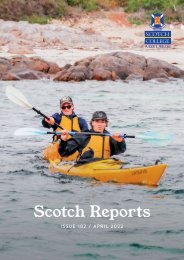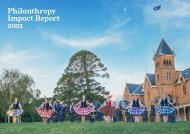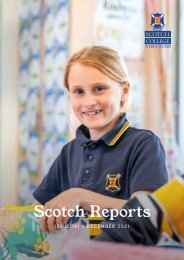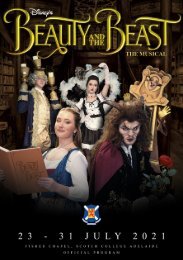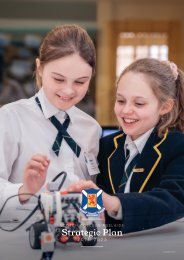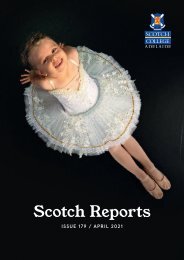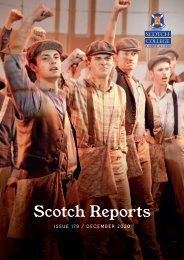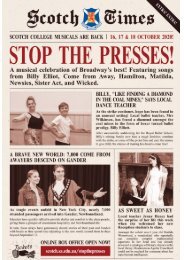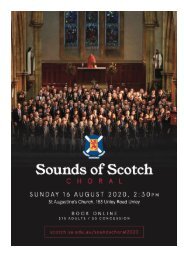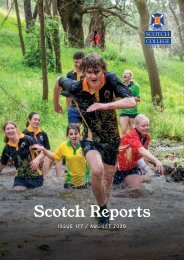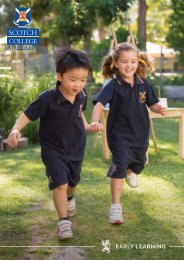Scotch Reports Issue 174 (April 2019)
In the first edition for 2019, we hear from Dr Newton, each of our Scotch campuses, plus a Scotch story from Andrew Saies and all of the Class of 2018 results and destinations. There are also articles from Head of Community, Natalie Felkl and a bumper Straight Scotch covering all things OC and a look back on 2018 OC reunions.
In the first edition for 2019, we hear from Dr Newton, each of our Scotch campuses, plus a Scotch story from Andrew Saies and all of the Class of 2018 results and destinations. There are also articles from Head of Community, Natalie Felkl and a bumper Straight Scotch covering all things OC and a look back on 2018 OC reunions.
You also want an ePaper? Increase the reach of your titles
YUMPU automatically turns print PDFs into web optimized ePapers that Google loves.
01 02<br />
03 04<br />
05<br />
LITERACY AND NUMERACY IN<br />
4-YEAR-OLD LEARNING<br />
Children begin to notice similarities<br />
in names and as their confidence and<br />
familiarity with the environment develops,<br />
some children become accustomed to<br />
reading friends’ names, or recognising<br />
names that start with the same letter<br />
sounds as their name.<br />
Our writing tables encourage children to<br />
represent their thinking through drawing<br />
pictures and writing scribed words<br />
connected to their illustrations. Children<br />
begin sounding out familiar words and<br />
having a go at writing these words. They<br />
begin to recognise common words in their<br />
environment and ‘read’ signs around them.<br />
Our Focus Learner Poster program<br />
invites children to create a poster using<br />
their literacy skills and then share this<br />
poster with the class. This project<br />
encourages the children to write titles,<br />
labels and draw pictures to represent an<br />
interest of theirs. The children learn the<br />
importance of representing information<br />
and how powerful their interests can be<br />
in building relationships and sharing ideas<br />
amongst peers.<br />
Dramatic play in the form of dress ups<br />
and role playing encourages children<br />
to experiment with creating scripts and<br />
building the necessary skills to share ideas,<br />
collaborate and explore different identities.<br />
Puppets and books build complexity and<br />
create new ideas for exploration.<br />
We encourage numeracy exploration in all<br />
areas of our learning environment, and it is<br />
especially evident as the children explore<br />
our outdoor learning areas such as in the<br />
sandpit and the mud kitchen. Children<br />
compare quantities, work out capacity and<br />
experiment with comparing the attributes<br />
of the tools that they are using.<br />
Inside we have resources such as<br />
dominoes, dice, number puzzles and<br />
counting disks, as well as supporting<br />
materials such as number lines and number<br />
cards. Children of this age must first<br />
build a concrete understanding of what a<br />
number represents, rather than simply rote<br />
learn the name of each number.<br />
Our group times are pivotal in bringing<br />
their understanding of Literacy and<br />
Numeracy together. We incorporate many<br />
different activities including quantifying<br />
our group each morning by counting how<br />
many children we have. Old favourites such<br />
as playing ‘What’s the time Mr Wolf?’ or<br />
‘The Kindy Train’ are exciting and help the<br />
children learn the connection between<br />
the number and what it represents,<br />
through games. Shared stories and songs<br />
build an understanding of rhyme and<br />
the conventions of reading. Songs and<br />
games encourage fun participation, whilst<br />
exploring an understanding of the Literacy<br />
or Numeracy content within each.<br />
GEORGIE SEPPELT<br />
4-year-old Teacher and Educational Leader<br />
Feature Using books for identification / 01<br />
Water makes them grow / 02 Drawing to<br />
represent ideas / 03 Recognising and matching<br />
/ 04 Using books and Mathematical equipment<br />
to recreate representation / 05 Looks what’s<br />
inside!<br />
9




